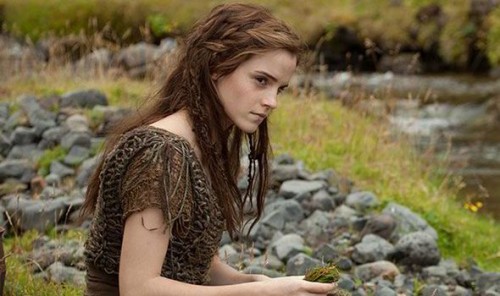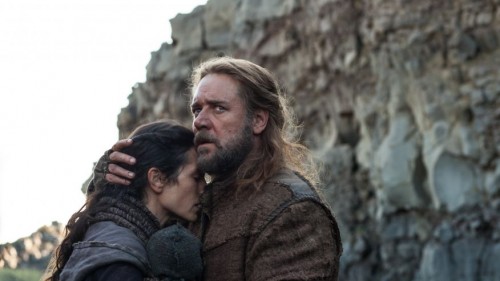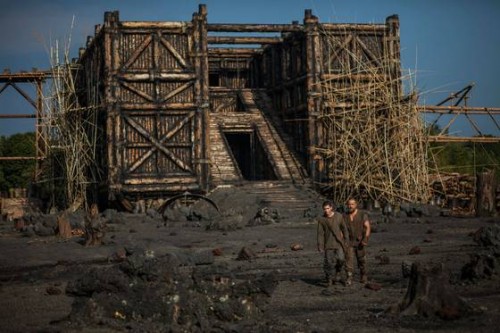
Director Darren Aronofsky’s new biblical epic, Noah, is wild – think of it as the 300 of Bible stories, an exaggeratedly Aronofskyan Silent Spring, or simply Kon-Tiki 6.0. It’s the director at his most ambitious yet, no longer content with harrowing tales of addiction or dark meditations on doppelgängers. His reach is as high as the firmament, and his grasp only slightly behind. The movie’s received a good deal of the wrong kind of attention from Christian viewers, who cite its (admittedly generous) artistic license, veering away from the original Bible story. Unfortunately, the biblical version contains few details, so some amount of improvisation on Aronofsky’s part was necessary. And regardless of how much violence may (or may not) have been done to the original story, at a time when bedrock stories of Western literature are on the decline for mainly religious reasons, any bringing-to-life of the primal images, fears, and clouded hopes of the original story seems welcome.
The movie constantly cuts to the disturbing image of an arm poised clenching a rock, in silhouette, Cain on the cusp of bashing his brother’s head in. The children of Cain, we learn, multiplied over the earth; Abel of course died; and Seth, Adam’s and Eve’s third child, bore a line of mostly good people, caring for the earth and worshiping the Creator, of whom Noah is the last. There is darkness ‘out there’, in the Victorian-futuristic steampunk industrial world of Cain, while Noah’s family is righteous. A crucial turning-point comes when Noah recognizes that his family, too, is unrighteous; all deserve God’s judgment. In other words, while Noah may be from Seth’s line and the bloodthirsty proto-industrialists from Cain’s, all are sons of Adam – all sin.
Noah looks into humanity and sees evil, self-preservation, and a Hobbesian world of brutality. Noah thinks that he was chosen by God because he can stare into the darkness of human nature and not look away. As a friend remarked after the movie, that’s also something of a mission statement for Aronofsky himself; all of his movies confront the darkness within us in unflinching gesticulations of horror. Noah gazes into the abyss, and he teeters on the brink of madness. All must die, he decides; if his son’s pregnant daughter has a girl (who would be the only female to survive the flood), Noah will kill her. All must die; humans have wrecked creation and dashed God’s will against the rocks of our own pathetic cravings for life and legacy.
This is the one point where Aronofsky falters. Since he cannot examine the horror of human darkness in a universal way – even big-screen IMAX is too small for his vision – he tends to narrow his focus to one part of that fallenness, be it addiction or insanity or whatever else. For Noah, Aronofsky drills down to the destructive impact of human beings upon our environment, the world God created for us. The exploitative civilization of Cain’s son clearly parallels our own, and the gorgeous photography, which oscillates between lush wilderness and post-industrial/apocalyptic wasteland, almost approaches doxology. The Creator must be worshiped through creation, he implies. Yet environmental exploitation limits the scope of human fallenness. It would have been tremendously effective as a symbol of humanity’s self-obsessed self-perpetuation, but the eco-friendly message occupies too much of the film’s scope. We are told that Noah’s family itself lives in the darkness of human ambition, but we see few signs of it. Noah’s eldest and youngest sons seem rather perfect, Methuselah plays the role of a wizened Gandalf, and Ila, Shem’s wife, is close to morally flawless herself. From a Christian perspective, Aronofsky should have gone beyond environmental exploitation and given a broader sense of human sin in general.
Noah’s ability to look into the darkness – even if we as viewers aren’t given quite as broad a vision of it as he – makes him decide that all humans must die, even his family. The conflict becomes a war between Tubal-Cain’s overly-anthropocentric, high-anthropology view of the world and Noah’s misanthropic self-hatred. After a hardcore Crowe character decides to kill his son’s children to extirpate the human race, Noah’s child pleads with him that God chose him because he is good. With passionate intensity, Noah replies, “The Creator chose me because he knew that I would complete the task.” For most of the film, he is every bit as merciless as the silent God of Aronofsky’s film.
Towards the end, Noah holds a knife over his granddaughter’s face, prepared to strike. The shot recalls that of Cain’s rock, poised above his brother’s head. Unintentionally, Noah is walking the path of Cain by murdering another human. In the hard calculus of judgment, no one may be left alive, and yet this hardline zealotry itself constitutes Noah’s sin, his own interior darkness. In a moment of spontaneity, he kisses the child. He cannot follow through with his perceived role as God’s agent of justice. He had asked God what he should do about the baby girl, and God was silent. The human race will perpetuate, in Aronofsky’s view, to the exploitative civilization of Cain we live in today. Whether Noah’s act of mercy was the Creator’s will or not – whether mercy does anything besides enable more human destruction – is ambiguous. But at the movie’s close, our visionary finally does the one thing most difficult for him: he chooses his family, forgives himself for his weakness (read: love), and settles in to the day-to-day, good and bad, sinful and (perhaps someday) justified world of everyday existence.
This stepping down into daily life is something Noah struggles with and perhaps, too, a place where Aronofsky comes up short. Apart from Noah’s wife’s preservation of esoteric garden herbs, we don’t see much of what life after the flood looks like. The characters are all well-rendered; despite Aronofsky’s artistic license with some of the events, all of his characters are plausible, filled-out versions of the biblical characters. But how do people live apart from life-and-death situations? Noah cannot settle into the world; his sense of purpose is so cosmic that once deliverance does happen, he can only sit in a cave and drink. It’s reminiscent of Walker Percy’s observation that people are happiest in disasters because they feel a strong sense of purpose, or Adam Phillips on the same theme:
Winnicott says somewhere that health is much more difficult to deal with than disease. And he’s right, I think, in the sense that everybody is dealing with how much of their own aliveness they can bear and how much they need to anesthetize themselves.
The scenes of judgment are harrowing, but they are exactly commensurate to the human darkness which Aronofsky plumbs. After disease, however, health is too much for Noah to bear. It’s too much for Ham to bear, who leaves, and Aronofsky can’t quite settle down, either. It’s this mundane shade of life, a quietly morose and gnawing feeling of emptiness, which drives us to subduing the earth with world-defacing violence, Babels of industry or of narrow morality, as in Noah’s temptation to kill the children. And yet this difficulty of living in the everyday also makes directors feel compelled to write moralizing messages of their own, accompanied by booming music and stunning CGI. And this reckoning with that gnawing mundaneness entails, first of all, recognizing human sin. Aronofsky goes far with the environmental component of that reckoning, but he stops short of a full view of fallenness. Noah tells his children to “fill the earth and replenish it”. It’s a worthy calling, but it’s one in which Noah’s children will ultimately fail. Something more is needed – not human improvement, but divine compassion. The image of the rainbow is a fitting close: it’s a sign of God’s promise not to destroy the world again.
Why won’t God destroy the world again? We’re tempted (and perhaps Aronofsky falls prey to this, too) to think that God will not destroy the world again because the sinners, the steampunk sons of Cain, were destroyed. In fact, it’s the opposite:
I will never again curse the ground because of humankind, for the inclination of the human heart is evil from youth; nor will I ever again destroy every living creature as I have done. (Gen 8:21)
God will not curse the ground again because “the human heart is evil from youth.” Given this evil, humanity cannot be remade by judgment; Noah’s sons cannot carry out his final mandate in the film. As the rainbow implies, a more drastic solution than judgment is required.
http://www.youtube.com/watch?v=_OSaJE2rqxU&w=600
While we’re on the subject, check out our newest publication, our own Mockingbird guide to Genesis!

COMMENTS
7 responses to “Mockingbird at the Movies: Noah”
Leave a Reply

















This movie wasn’t based on the Bible.
Such connection may have been a selling point, but it surely wasn’t the point:
http://drbrianmattson.com/journal/2014/3/31/sympathy-for-the-devil
That one’s making the rounds, but I’m gonna wait and see if anybody else sees the film as he does. For one thing, why doesn’t he mention the lava monsters might well be Aronofsky’s depiction of the nephilim, who come right before the story of Noah. Picked up in later tradition, no doubt, but not created out of whole cloth. I also don’t like reviews that sound like, “Why are you all such idiots, –this elaborate secret code should be obvious to anybody!” Talk about your gnostics!
I just saw the movie and it was good…
Aronafsky did take creative liberties, yes. And it was nice to see him do it: Noah’s Ark can be depicted as a happy boat with giraffe heads sticking out, a rainbow overhead, and a dove of peace swooping in to save the day. Much of real life (emotions, sufferings, sins, etc.) is omitted in those few chapters of Genesis where most of the human race is wiped out by God. That is serious, fearsome business. What did those people experience? It is terrifying for me to imagine. Aronofsky did…and he “did not look away”.
The fear of God came upon me in power through a Lauryn Hill MTV Unplugged album, a Stephen King book titled “Desperation”, the Bible, prayer and evangelism, etc. I worship the Father, Son, and Holy Spirit as of 1999-2000 (give or take). Maybe the Lord will do the same through Aronofsky’s Noah. You never know.
As a side note, Noah’s final decision regarding the babies was not out of a gnostic worldview: material and/or human flesh being evil in itself, though he began that way. Do you agree BB?
I thought the world was going to be destroyed by fire next time and Jesus was going to come again to judge the living and the dead. Silly Bible, silly creeds.
MC – both good points. “The fire next time” of 2 Peter doesn’t necessarily suggest a total destruction; such a reading might, for instance, be at variance with: “I will never again curse the ground because of humankind, for the inclination of the human heart is evil from youth; nor will I ever again destroy every living creature as I have done”, the passage quoted in the article. I’d also refer to Richard Bauckham’s book on the theology of Revelation, as well as Barbara Rossing’s shrill but at times good critique of traditional evangelical views concerning the destruction of the world. Mangina’s fairly recent commentary on Rev is good, too – his reading of the apocalyptic plagues being a high point.
As to Christ the judge – yep. That could be construed as comforting and inseparable from his role as sacrifice, redeemer, etc. See you in NYC?
I am certainly no Greek scholar, but I understand that the 2 Peter 3:10 passage is ambiguous in terms of whether it means that the “world” will be consumed by fire next time, or that the works that don’t pass muster will be exposed. Either way, there is some kind of “hellacious” judgment going on. Then there is 2 Peter 3:7:
“By the same word the present heavens and earth are reserved for fire, being kept for the day of judgment and destruction of the ungodly”
And then there is Paul’s description of why the “outsider” coming to a Christian service needs to understand what is being said in 1 Corinthians 14 :”But if an unbeliever or an inquirer comes in while everyone is prophesying, they are convicted of sin and are brought under judgment by all,as the secrets of their hearts are laid bare. So they will fall down and worship God, exclaiming, “God is really among you!”” Hey, I’m a lawyer and make my living on ambiguity, so I know the drill, but there is an awful lot of stuff in the NT to deal with if we want to say that Christ’s death and resurrection has put an end to all judgment of any kind.
Wish I could make NYC. Spufford sounds extremely interesting.